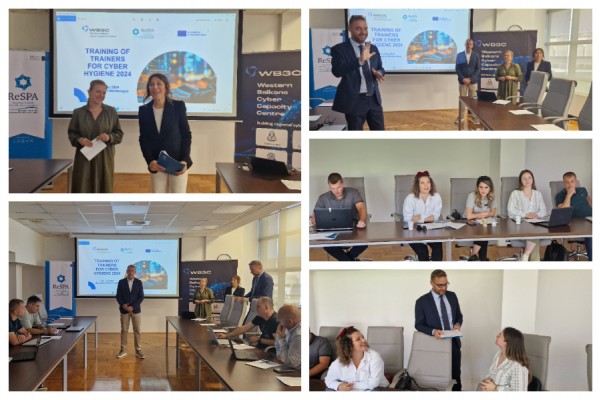
ReSPA and the Western Balkans Cyber Capacity Centre Joined Forces Towards a More Secure Digital Future for the Western Balkans
4-6 June 2024, Podgorica, Montenegro
In a significant stride towards enhancing cyber resilience and fostering a robust cybersecurity culture across the Western Balkans, the ReSPA and the Western Balkans Cyber Capacity Centre (WB3C) successfully convened a new edition of comprehensive Training for Trainers in Cyber Hygiene.
The training aimed to educate 17 selected senior-level public officials to become adept trainers in cyber hygiene, now equipped with the knowledge and skills that they would be able to spread to their peers, enabling them to better recognise and manage cyber security risks at the operational level.
“Cybersecurity is not just a technical issue but a fundamental aspect of national security and public administration efficiency. Our collaborative efforts with our partners from the WB3C are significant steps towards a resilient cyber ecosystem in the Western Balkans. Understanding and adopting the skills in cyber hygiene across public administrations will strengthen this first line of protection, and augmenting the number of civil servants practising it will enable their organisations to react promptly or recover swiftly if attacks occur. This training will result in having new trainers in public administration on cyber security, new resources for transferring the knowledge and ultimately achieving bigger digital security and resilience." underlined Olivera DAMJANOVIĆ, ReSPA Programme Manager.
Cedric GROUSEET, Head of the Western Balkans Cyber Capacity Centre, emphasised the importance of strong collaboration between the Centre and public institutions and partners, including the Ministry of Public Administration of Montenegro and ReSPA. He highlighted the significance of a regional approach in training modules for civil servants. "Today, for the first time, we have gathered civil servants from the Western Balkans who work in cyber security to learn, exchange ideas, and advance in cyber hygiene and cyber security. More importantly, we will train them to become trainers, enabling them to further disseminate this knowledge to their peers across the region."
Dušan POLOVIĆ, Director of the Directorate for Infrastructure, Information Security, Digitization, and e-Services in the Ministry of Public Administration, also addressed the participants, emphasizing the importance of continuously developing resilient cyber security structures in the Western Balkans. He noted that this three-day training is a crucial step in strengthening regional capacities in cyber security.
The training program included engaging lectures for in-depth knowledge of trainee skills, theoretical insights, and practical exercises on cyber hygiene:
- Educational Skills Modules focused on Outcome-based Education, Teaching Preparation, and Teaching Methods and Techniques. Participants will gain insights into educational principles, communication techniques, and effective teaching methodologies;
- Core Cyber Hygiene for Users covered key topics such as information security, ISO/IEC standards, cybersecurity threat awareness, and preventive measures. Attendees will explore crucial aspects of cybersecurity policies, threat awareness, and preventive measures to safeguard their institutions;
- Practical Exercises to reinforce learning and develop hands-on skills in Incident Management Procedures. Participants will use real-world scenarios to enhance their problem-solving abilities and response strategies during cybersecurity incidents.
The successful completion of this training marks a pivotal moment in the region's journey towards enhanced cybersecurity while capacitating public officials with the necessary knowledge and skills to train their peers, thereby promoting a culture of cyber hygiene within their institutions
ReSPA and WB3C remain committed to supporting public officials in their efforts to protect data and ensure the security of public administration systems across the Western Balkans.



